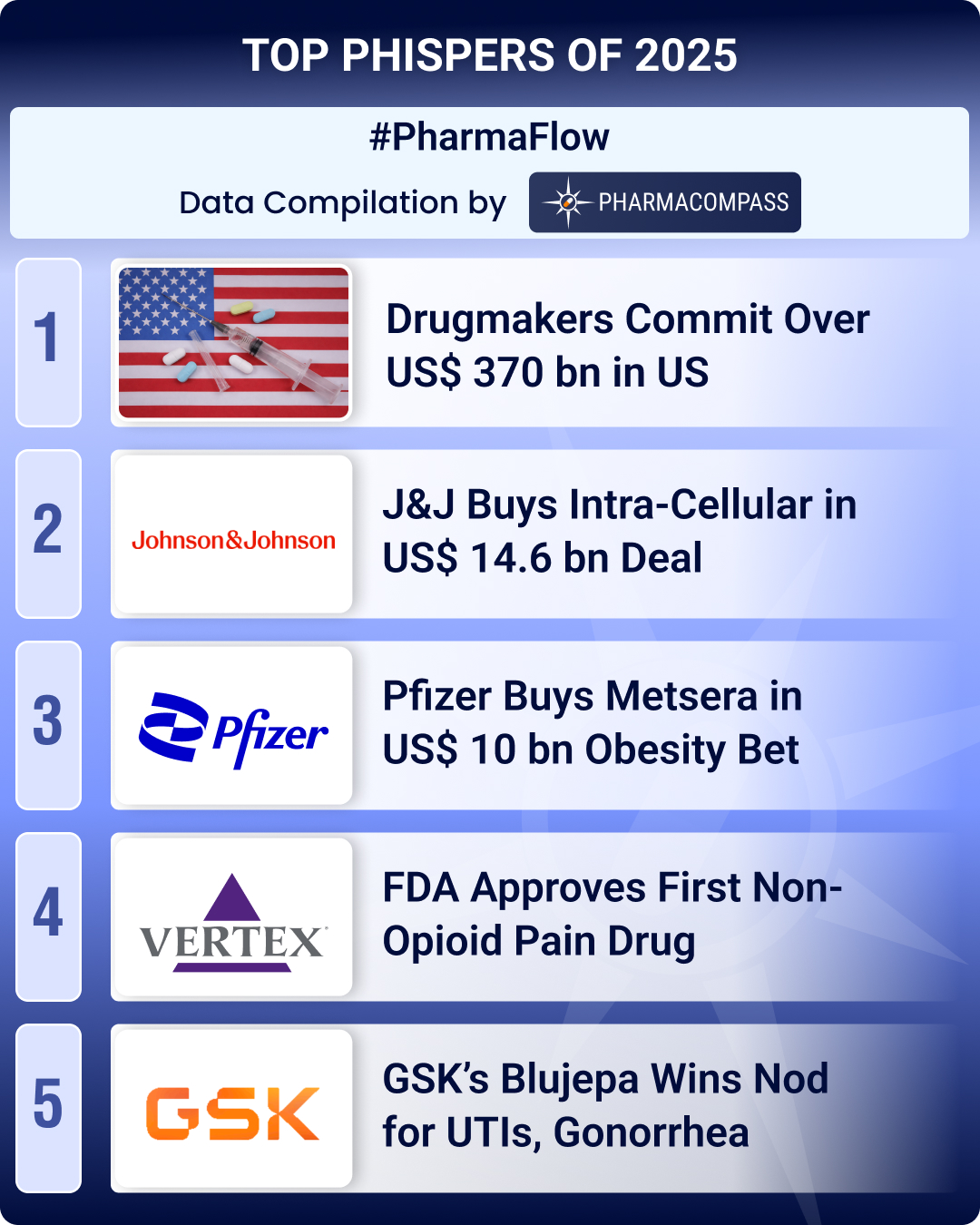
This week, Phispers brings you an update on M&As in the drug and medical equipment industry, along with verdicts of lawsuits against GSK and Mylan. There is also news on Samsung Bioepis’ biosimilar —Renflexis; a directive from the Medical Council of India for doctors to prescribe generics; and news that Marathon may soon wind up. Read on.
M&A
update: Fresenius buys Akorn; Becton Dickinson to acquire C R Bard
Fresenius Kabi-Akorn: Fresenius Kabi is buying US-based manufacturer and marketer of prescription and over-the-counter drugs — Akorn — for around US $ 4.3 billion, or US $ 34.00 a share. Kabi will also assume approximately US $ 450 million of Akorn’s debt.
The transaction, which is likely to close by early 2018, has the support of Akorn's largest shareholder, who controls approximately 25 percent of its shares.
Akorn is a specialty generic pharmaceutical company engaged in the development, manufacture and marketing of multi-source and branded pharmaceuticals.
Sawai to buy Upsher Smith: A leading generics manufacturer in Japan — Sawai Pharmaceutical — and US-based generics manufacturer — Upsher-Smith Laboratories — announced an agreement whereby Sawai will buy the generic pharmaceuticals business of Upsher-Smith, from its parent — Acova for $ 1.05 billion.
Upsher-Smith is a privately held drug company, based in Minnesota. It’s owned by the Evenstad family through their company, Acova. It has a diversified product portfolio of over 30 pharmaceutical products.
Becton Dickinson to acquire C R Bard: Becton Dickinson and Co, a medical equipment supplier, will acquire C R Bard Inc in a US $24 billion cash-and-stock deal. This way, Becton Dickson will add Bard's devices to its portfolio in the high-growth sectors of oncology and surgery.
This is the latest in a string of deals in the medical technology sector. Two years ago, Becton Dickinson had acquired CareFusion Corp for US $ 12 billion.
This acquisition will strengthen Becton Dickinson’s position in the markets for catheters, pumps and other items.
FDA approves Samsung Bioepis’ biosimilar; Merck to sell it in US
This week, the US Food and Drug Administration (FDA) approved Samsung Bioepis' Renflexis (infliximab-abda) — a biosimilar referencing Remicade (infliximab), across all eligible indications.
In the US, Renflexis is indicated for reducing signs and symptoms in patients with adult and pediatric Crohn’s disease, adult ulcerative colitis, rheumatoid arthritis, ankylosing spondylitis and psoriatic arthritis, and for the treatment of adult plaque psoriasis.
The FDA approval comes as a blow to Johnson & Johnson’s top earning drug Remicade, which may finally begin to experience greater competition at lower prices.
Samsung Bioepis is a big player in the field of biosimilars. It has arrived in the US market close to a year after the EMA approved it for Europe.
While Merck KGaA, the German Merck that specializes in chemical, pharmaceutical and life sciences sectors, sold its biosimilars business to Fresenius Kabi this week, in the US, Merck will be marketing Samsung Bioepis’ Renflexis.
In Germany, Merck KGaA is selling off its entire development pipeline and an experienced team of more than 70 employees located in Aubonne and Vevey (Switzerland) to Fresenius Kabi for Euro 670 million. The product pipeline has a focus on oncology and autoimmune diseases.
Confused about the two Mercks? Read: Merck vs Merck: A ‘Mercky’ Tale
Doctors
in India to prescribe generics; to face action if found violating norms
Last week, Phispers carried news that India’s Prime Minister Narendra Modi indicated his government may bring in a legal framework under which doctors will have to prescribe generic medicines. And soon, the Medical Council of India asked all registered medical practitioners to ensure they prescribe drugs with generic names only.
The MCI has asked the medical community to follow its 2016 notification in which it amended the clause 1.5 of the Indian Medical Council (Professional Conduct, Etiquette and Ethics) Regulations, 2002 mandating the doctors to prescribe medicines by generic names in place of brand names.
Therefore, if a patient is complaining of fever, the doctor must prescribe ‘paracetamol’ (the generic name drug), and not Crocin or Dolo (which are brand name drugs).
This move will prevent doctors from prescribing brand-name drugs that are costlier. India’s medical regulator has also warned doctors of action against those found violating these regulations.
This news comes at a time when price control on stents in India has led to companies withdrawing their innovative products from the market. A stent is a tiny expandable tube shaped mesh to open up narrowed or weakened coronary arteries. It is performed in a cath lab, using a less-invasive procedure known as angioplasty.
Last week, Abbott announced it is withdrawing two of its latest coronary stents from India as they were not commercially viable. This includes a bio-absorbable stent that was introduced by the company four years back.
In February this year, the National Pharmaceutical Pricing Authority had effected up to 80 percent price cuts on stents under the Drug Price Control Order (DPCO). The price of a bare metal stent was fixed at around US $113 (Rs 7,260) and drug eluting stent (DES) and biodegradable stents at around US $462 (Rs 29,600).
After
the controversy around DMD drug, Marathon may wind up next month
After creating much hype and controversy around its effort to market a cheap overseas steroid — deflazacort — to the Duchenne muscular dystrophy (DMD) community in the US at a list price of US $ 89,000, Marathon Pharmaceuticals is now quietly planning to shut down its operations.
On February 9 this year, Marathon had received FDA approval for Emflaza (deflazacort), tablets and oral suspension, to treat patients aged 5 years and older with DMD, a rare genetic disorder that causes progressive muscle deterioration and weakness.
Since the drug has been approved outside the US for decades, patients in the US imported the drug from Canada and the UK, where it’s available at a price between US $1,000 or US $2,000 a year.
An article published in Endpoints News cites the divestiture of deflazacort to PTC as the main reason why Marathon may not exist past May 1, 2017. When the author of the article contacted Marathon, he received the statement: “With the wind down of our Emflaza business following the close of the PTC transaction on April 20, we will continue to manage the legacy matters of Marathon Pharmaceuticals.”
This news comes at a time when PTC, the company that purchased the rights for the drug from Marathon, suffered a setback as the Washington State Drug Utilization Review Board decided to recommend another medicine for the treatment of the disorder.
The board endorsed a policy by the Washington State Health Care Authority, which administers the state Medicaid program, that prednisone is the “lower cost, equally effective alternative” to Emflaza, the drug that PTC bought for around US $140 million last month from Marathon.
Sanofi highlights Mylan’s unfair trade practices in lawsuit
Earlier this week, Sanofi SA sued Mylan NV, accusing it of engaging in illegal conduct to suppress competition to its EpiPen allergy treatment. Mylan’s EpiPen has been at the centre of a public debate on the pricing of drugs.
The lawsuit was filed in Trenton, New Jersey. According to Sanofi, Mylan caused it a loss of hundreds of millions of dollars in sales by erecting barriers that denied American consumers access to and use of a rival product — Sanofi’s Auvi-Q.
Auvi-Q had been introduced by the French drugmaker in 2013 to treat anaphylaxis in patients who are at risk of or have a history of the potentially fatal allergic reaction. The company ceased marketing of the product in 2015 following a recall.
In a statement, Sanofi sought damages for Mylan's conduct in the market for epinephrine auto-injectors.
With the lawsuit filed by Sanofi, Mylan appears to be getting a taste of its own medicine, Back in 2015, in a bold and unusual move, Mylan had sued West Virginia to keep its EpiPens on the state’s “preferred drug list”. The move failed. However, it revealed yet another way in which Mylan can use aggressive marketing and legal tactics to boost profits from EpiPens.
Since Mylan acquired rights to EpiPen in 2007, the company raised its price by more than 400 percent.
While Sanofi is fighting Mylan in the US, in its home country it has to address regulator’s concerns over Valproate, its treatment against epilepsy and bipolar disorders.
According to the French drug regulator, up to 4,100 children in France suffered major malformations in the womb after their mothers took Valproate between 1967 and 2016. Valproate, which is manufactured in France by Sanofi under the brand Depakine for epilepsy and Depakote and Depamide for bipolar disorders, is also believed to cause slow neurological development.
GSK
to pay US $3m in suicide case; Teva introduces
competition to Advair
GlaxoSmithKline must fork out US $3 million to a woman who sued the British drug maker because her husband committed suicide after taking a generic equivalent of GSK’s antidepressant — Paxil, a federal court in the US ruled.
Back in 2010, Stewart Dolin (a partner at law firm Reed Smith LLP) jumped in front of an ongoing commuter train after taking the generic version of Paxil. The verdict in favor of his wife — Wendy Dolin — was confirmed by GSK. However, the company said it should not be made liable since GSK did not manufacture or market the medicine.
The lawsuit had been filed by Wendy Dolin in 2012 against GSK and Mylan — which manufactured the generic version of Paxil. However, a federal judge dismissed Mylan from the lawsuit in 2014.
There was more bad news for GSK, as Israeli drugmaker Teva Pharmaceutical Industries launched the first direct competition to GSK’s best-selling Advair (an inhaler with APIs — fluticasone propionate and salmeterol).
Teva had won the US regulatory nod to make an inhaler that’s similar to Advair in January this year. However, Teva also launched a generic version of its own inhaler, AirDuo RespiClick.
AirDuo is not a true generic of Advair, but contains the same two APIs. However, it delivers a lower dose of salmeterol.
The PharmaCompass Newsletter – Sign Up, Stay Ahead
Feedback, help us to improve. Click here
Image Credit : money! by Hans Splinter is licensed under CC BY 2.0
“ The article is based on the information available in public and which the author believes to be true. The author is not disseminating any information, which the author believes or knows, is confidential or in conflict with the privacy of any person. The views expressed or information supplied through this article is mere opinion and observation of the author. The author does not intend to defame, insult or, cause loss or damage to anyone, in any manner, through this article.”





